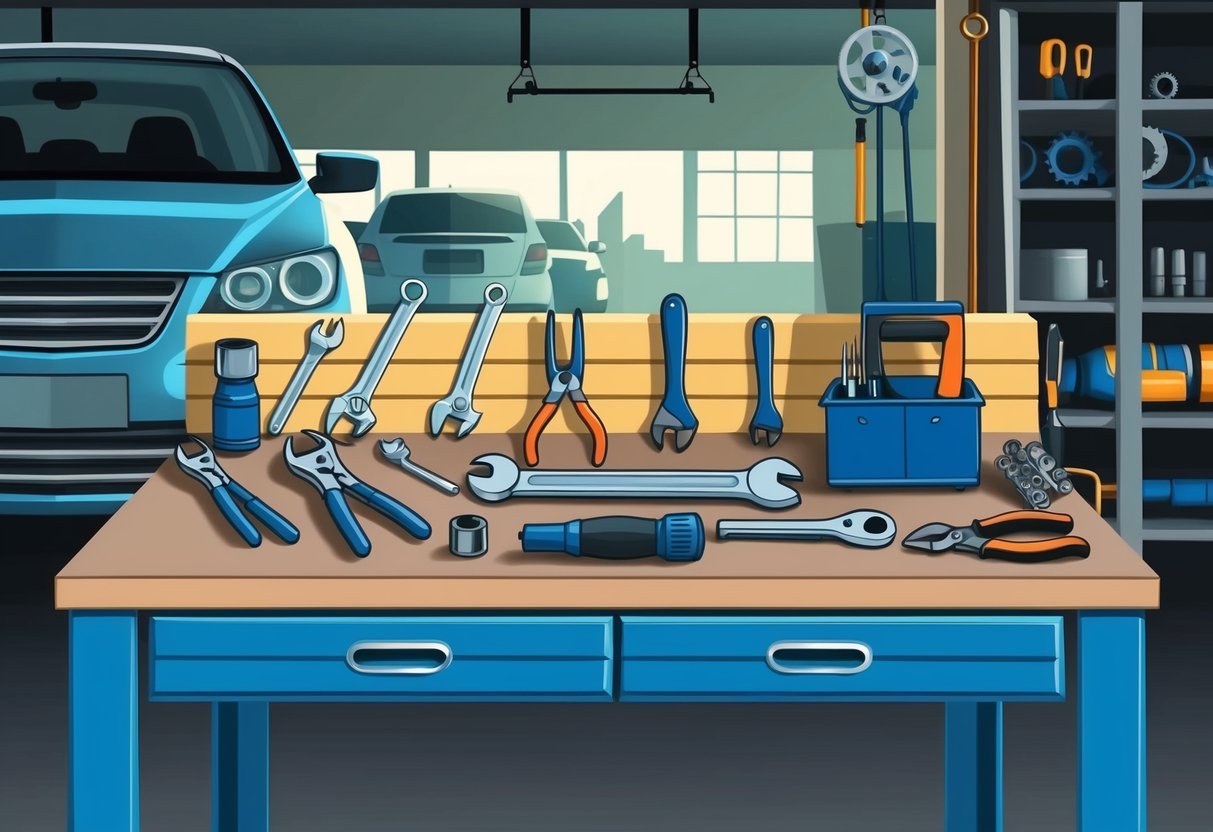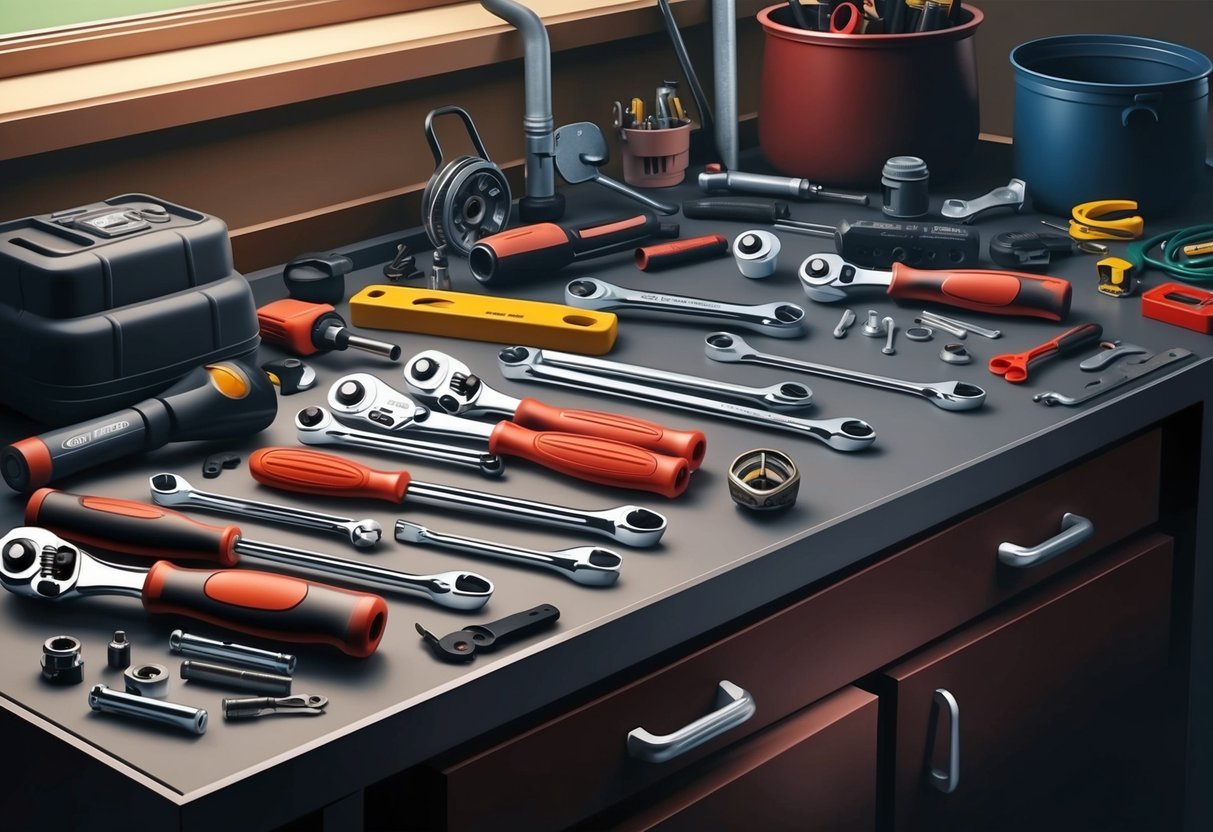
Every beginner ready to tackle DIY car repairs needs a set of essential tools in their garage to handle the most common car repair and maintenance tasks. Equipping a workspace with the right items—such as socket sets, wrenches, pliers, and screwdrivers—makes basic jobs like changing oil, fixing a flat tire, or replacing batteries straightforward and less stressful.
Even newcomers can save money and gain confidence by having a reliable foundation of tools on hand.
Selecting the right tools for basic car repair ensures efficiency and safety for all future projects. Items like a lug wrench, jack, and torque wrench make simple car repairs such as rotating tires or tightening bolts much more manageable.
Readers can learn more about staple equipment like a breaker bar, funnel, and inflator in guides like the essential tools for basic car repairs.
Must-Have Basic Hand Tools
Every beginner working on car repairs needs a handful of basic hand tools for efficiency, safety, and accuracy. Investing in quality versions of these essential tools ensures smoother repairs and fewer frustrations while tackling most DIY automotive tasks.
Socket Sets
A socket set is essential for removing and tightening various nuts and bolts on a vehicle. These sets commonly include both shallow and deep sockets, allowing users to reach fasteners in tight or recessed areas.
The most helpful sets contain multiple drive sizes, usually 1/4″, 3/8″, and 1/2″ drive, which fit a range of socket sizes. Look for a socket set that includes both metric and SAE measurements, as cars can use both.
Ratchets should be sturdy with fine-tooth engagement for smooth operation. Extension bars and universal joints are valuable additions since they provide better access in cramped spaces.
Many recommend storing sockets in a labeled case or rail to keep organization simple. Changing out old or worn sockets avoids rounding off nuts and bolts.
For a more detailed breakdown, this complete mechanic tool list covers socket types and usage in depth.
Wrenches
Wrenches allow for precise adjustments and are crucial for loosening or tightening bolts that are not accessible with a socket. The most common type is the combination wrench, which features an open end for quick loosening and a boxed end for a secure fit on the fastener.
Metric and standard sizes ensure compatibility with most vehicles. Basic wrench sets often include sizes from 8mm to 19mm (metric) and 1/4″ to 3/4″ (SAE).
These size ranges cover the vast majority of automotive needs. Sturdy chrome-vanadium steel helps resist corrosion and guarantees a longer lifespan.
Flexible-head or ratcheting wrenches can save time in tight spots. For heavy-duty work, a breaker bar or a longer-handled wrench may be required to increase leverage.
See examples of must-have wrenches and wrench sets for DIY car owners.
Screwdrivers
A set of screwdrivers is necessary for removing and installing a variety of fasteners throughout the vehicle. At minimum, a basic hand tool kit should contain Phillips and flathead drivers in multiple sizes.
Magnetic tips help hold fasteners in place and avoid dropping screws in hard-to-reach locations. Screwdrivers with ergonomic, non-slip handles reduce hand fatigue and provide better control.
Long- and stubby-shaft options offer access to both deep recesses and tight spaces. For vehicle electrical work, an insulated or voltage-tested screwdriver increases safety.
Some sets include specialty heads, like Torx or square drive, which are now commonly found in automotive applications. Organizing screwdrivers by type and length improves workflow.
Learn more about essential screwdrivers for automotive repair in curated tool lists.
Pliers
Pliers are indispensable for gripping, twisting, cutting, and pulling a range of materials. The most commonly used types in automotive repair include needle-nose, slip-joint, and locking pliers.
Needle-nose pliers excel in tight areas and for handling small parts or wires. Channel-lock pliers adjust to grip larger objects, and locking pliers (often called Vise-Grips) are ideal for holding parts steady or breaking loose stubborn bolts.
Cutting pliers quickly snip wire, hose clamps, or small metal pieces. Padded handles provide comfort during extended use and lessen hand strain.
Rust-resistant finishes are important, as pliers are frequently used around fluids and moisture. For an expanded look at basic pliers and their uses, see overviews on trusted tool retailer sites.
Ratchets and Extensions

Having the right ratchets, extensions, and adapters enables beginners to reach and loosen fasteners in difficult locations. Matching the right tool to the job prevents stripped nuts and keeps repairs efficient.
Ratchet Types
A ratchet is a hand tool that allows users to tighten or loosen bolts efficiently, working with socket sets for versatility. Most car repairs call for three main drive sizes: 1/4-inch, 3/8-inch, and 1/2-inch.
The 1/4-inch ratchet is ideal for tight spaces and smaller bolts. The 3/8-inch size is the all-purpose tool for most automotive tasks, balancing strength and maneuverability.
A 1/2-inch ratchet is best suited for large, stubborn bolts requiring higher torque. For exceptionally tight or rusted fasteners, a breaker bar, which offers extra leverage, is helpful.
Many ratchets feature quick-release and fine-tooth designs, giving smoother engagement and easier socket changes. A quality ratchet set should include metric and SAE sockets, ensuring compatibility with most fasteners.
Swivel or flex-head ratchets add convenience for those hard-to-reach bolts, especially in compact engine bays. For a thorough list of recommended tools and ratchets, refer to this list of essential automotive tools for mechanics.
Using Extensions and Adapters
Extensions help users reach bolts deep within an engine bay or behind components. These are especially valuable when a socket alone cannot access the fastener.
Extensions come in several lengths, usually ranging from 3 inches to 12 inches, and can be linked for extra reach. Adapters allow sockets to fit different ratchet sizes, maximizing flexibility in a toolkit.
For instance, a 3/8-inch to 1/4-inch adapter lets a user fit smaller sockets on a larger ratchet, or vice versa. Universal joints, sometimes called “wobble extensions,” allow the socket to pivot and turn fasteners at awkward angles.
Including both standard and deep-well extensions and adapters minimizes frustration on complicated jobs. Keeping these on hand ensures that even tricky or recessed bolts aren’t out of reach.
This practical advice is echoed in many guides, such as this list of tools beginners need to work on cars.